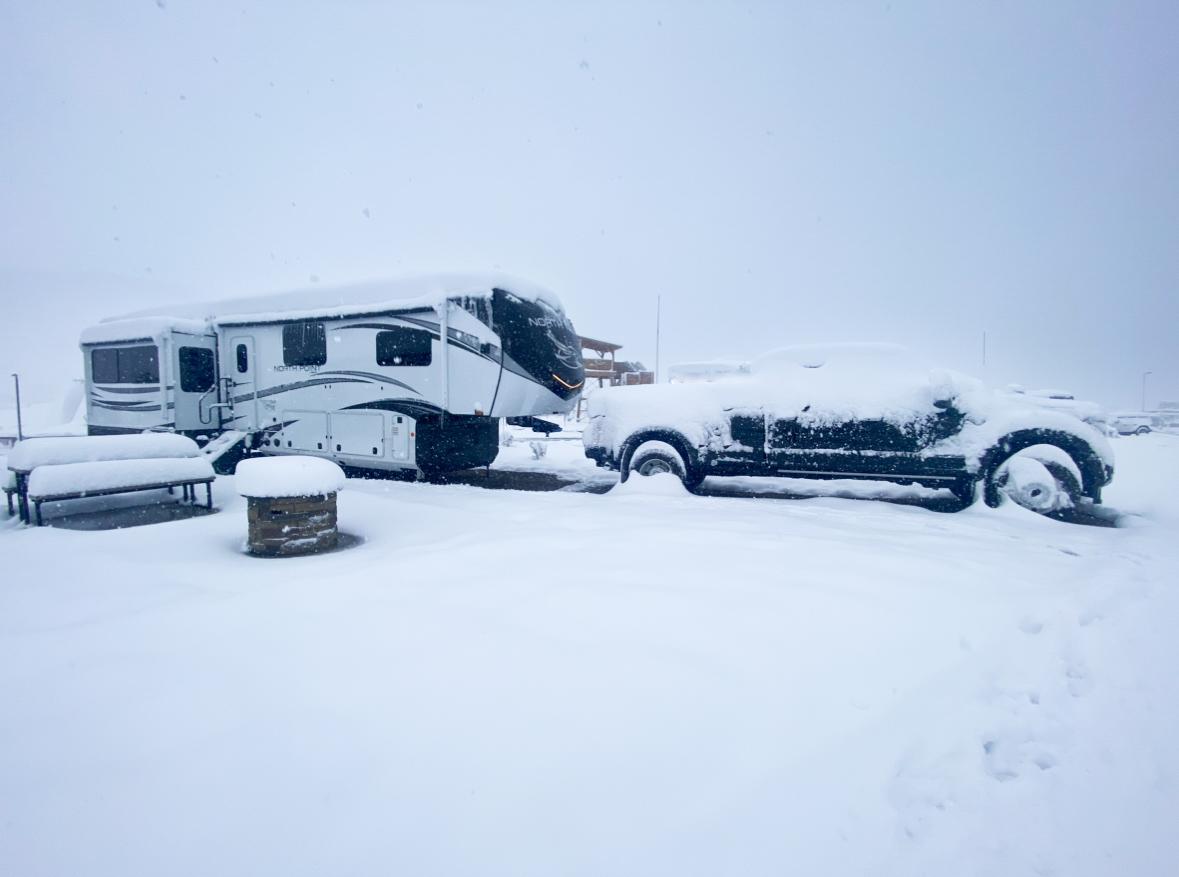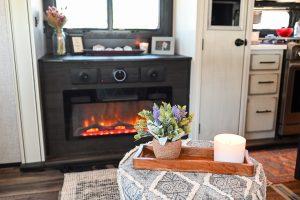Can you Boondock in the Winter Months?
December 4, 2023 | Gwendolyn Call
Can you Boondock in the Winter Months?

Chaos, Kiddos & Harmony’s Home on Wheels
Let us look at the Pro’s & Cons
Last winter we, meaning I, decided we wanted to spend the winter months RV’ing in a cold climate. To be exact we chose Santa Fe, New Mexico, and although initially without knowing, one may assume this is a warm area in the southwest. But, you may be surprised to find out that this area is in fact cold and has temps in the teens during the winter months. We flourished in the cold and snow, skiing, snowboarding and ample snowball fights and we loved every moment, but and there is a big but… we were prepared and warm.
The big question you may be wondering is, why would you want to spend the winter in your RV in cold weather boondocking? There are several reasons this may fit for you, locations in warmer climates are extremely hard to come by in the southern states and come at a very high price. You may have a family you moochdock with over the holidays or like us, you are embracing a season of cold.
The big question is, can you in fact boondock in the winter months? The answer is yes, and you can do it comfortably. The basics are crucial though, like anything in the RV space the learning curve is steep. It is one thing to not be able to brew a cup of coffee in the morning, but it is a whole new level of inconvenience if you are in fact cold in your RV. Once you’ve decided welcome a winter in your RV there will be nothing more important than being prepared.

Chaos Kiddos & Harmony
Be Prepared: What do you need and why
Being prepared will be the first step into making your RVing in the winter months much more enjoyable. There are several factors that will come into play for being prepared for those winter months in an RV. Depending on how cold the climate is, some of your warmer weather “nice to haves” turn into “must haves!” First you will want to consider if your RV is “all weather” and lastly if you are boondocking, you will want to make sure you have a few key items and more importantly enough power for those overcast days.
Here are a few items that are a “must” when wintering in your RV. The first, and an extremely key item for cold days and nights is propane, and you need to make sure you have a full tank as a spare. Speaking from experience, having experienced a 2:00am wake up, freezing cold, only to find out you have run out of propane, this is something you do not want to experience. Most modern RVs use propane for 3 things: cooking, heating, and hot water. Keeping the inside warm is one thing, but what can you do about the outside air? A widely ignored pro tip for cold and windy conditions is a good quality RV skirting. This skirting is key in keeping cold out from under your rig including blowing snow and icy wind chills. The name of the game is keeping the cold out, and the warmth in.

Warm Fire in our Jayco RV
You can conserve power and propane by cooking the old-fashioned way, over an open fire outside. If you ensure you have plenty of good firewood, you can cook pretty much anything outside, and keep yourself warm in the process. There are hundreds of products from coffee cans, grill accessories built for camping and cooking outdoors. Just imagine a scenic view or a snowy landscape, a nice fire, and good food!
The above items are some key must haves for winters in the great outdoors, let’s talk about your power needs. If wintertime RV is for you, you will need the correct power system for your home on wheels and the backbone of the right system is the batteries.
Pros and Cons and how your RV Batteries can Save the Day
Winter will be a wonderful time of year for RVing. Thats what having the power you need, when you need it is so critical. Your solar power system will be key in maintaining your power needs. Your battery pack will be even more important during the winter months. Keeping warm inside takes energy. Sometimes the winter skies are not always sunny, so the solar panels may not be available to recharge your system every day. This is when your battery’s capability and technology come into play. Lead acid batteries, although widely available have some drawbacks in extreme temperatures.
The lifespan of the lead acid battery types is impacted when in extreme temperatures. In simple terms, lead acid batteries do not work properly in extreme temperatures making them unreliable, this is a less safe and less reliable battery to use during wintertime RVing. Lithium batteries withstand the cold much better than their lead acid counterparts, with no degradation in performance. More specifically, Dakota Lithium batteries charge up to 5 times faster and last 4 times longer than traditional batteries. They also outperform other batteries up to 200% for power storage.
These batteries can hold power longer and provide the power you need, even if the sun does not show up every day or if your solar panels are covered in snow. This point so important. Without the reliability of Lithium batteries you can and will find yourself out of power. This is not a position you want to be in while boondocking in the winter.
Will You Adventure into the Cold this Winter
As you can see there are plenty of pros and cons. If you are a snow bunny and love all those wintertime activities than take advantage of finding amazing locations. Less people and an excellent opportunity to save money while boondocking for the winter.
Do yourself and your family a favor and make sure you have the right batteries for the job. More wintery fun, and happy warm nights with the power you need, when you need it. This is why our family trusts Dakota Lithium batteries. We are able to explore those secluded boondocking locations all year now and that is an incredible advantage to have in RV life. What are you waiting for, embrace the cold this winter season.
Happy Adventuring,
Gwendolyn from Chaos Kiddos & Harmony